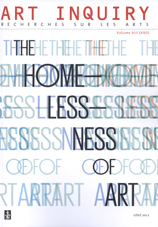The construction of subjectivity in Theodor W. Adorno’s aesthetic theory: criticality, reflection, mimesis
The construction of subjectivity in Theodor W. Adorno’s aesthetic theory: criticality, reflection, mimesis
Author(s): Agnieszka Rejniak-MajewskaSubject(s): Philosophy
Published by: Łódzkie Towarzystwo Naukowe
Keywords: Modernism; subjectivity; (theory of a) work of art; criticism; Theodor W. Adorno.
Summary/Abstract: In my article I try to highlight the relation between Theodor W. Adorno’s discussion of subjectivity and his conception of art and aesthetic experience. By recalling G. Lukács notion of “transcendental homelessness” I focus on the modernist understanding of the autonomous work of art, as the figure of individual’s solitude and a special locus of criticism. The question of subjectivity in Adorno’s philosophy is especially interesting because on the one hand he opposed the traditional notion of the subject, regarded as autonomous, self-sufficient and selfidentical. On the other hand, however, he felt obliged to defend the individual subject against what he saw as an overpowering force of social “totality”. This dialectic was reflected in his conception of art: a work of art was to play a part equally as the means of critique of the individual subjective ego, and a point of resistance for individual consciousness that would shelter it from the threatening dissolution.
Journal: Art Inquiry
- Issue Year: 2011
- Issue No: 13
- Page Range: 35-52
- Page Count: 18
- Language: English

